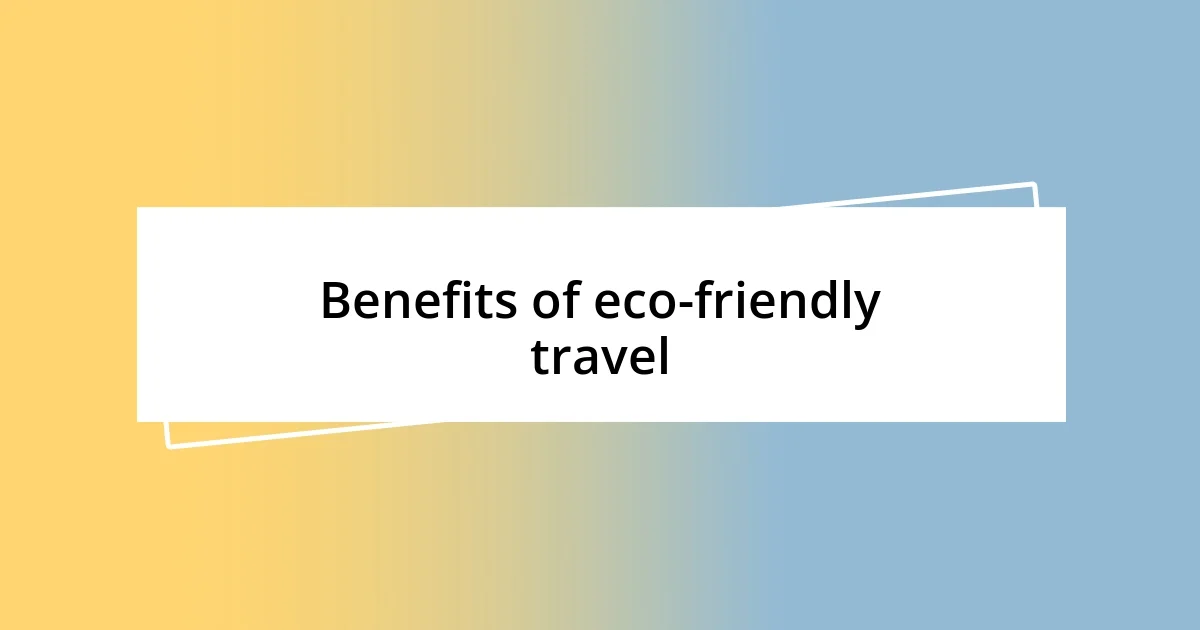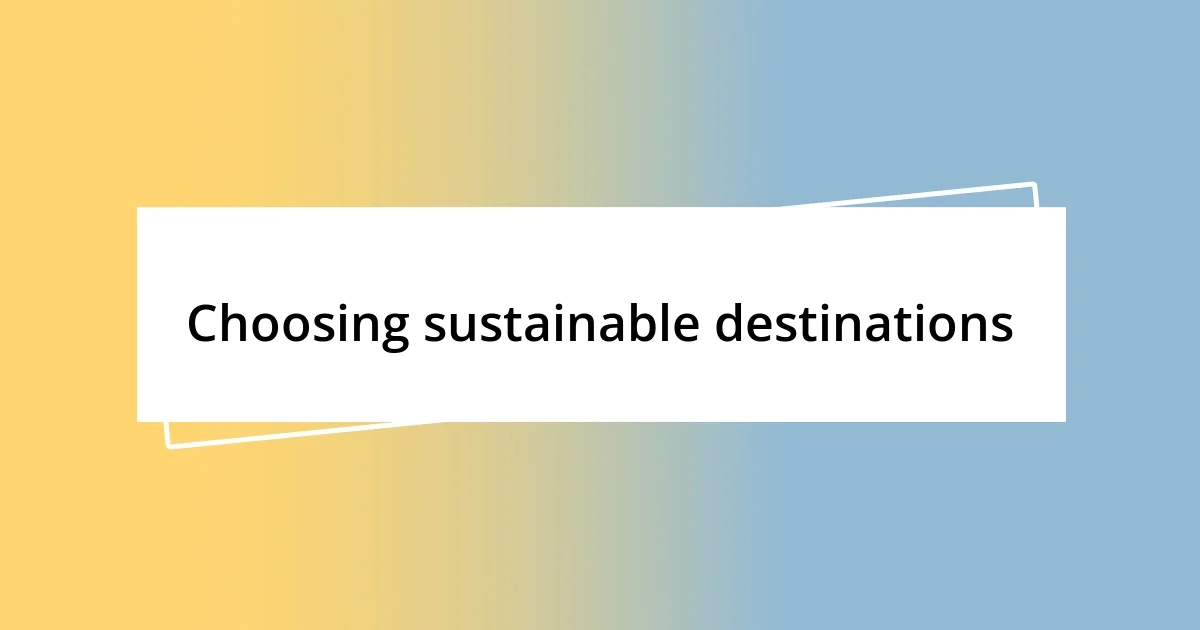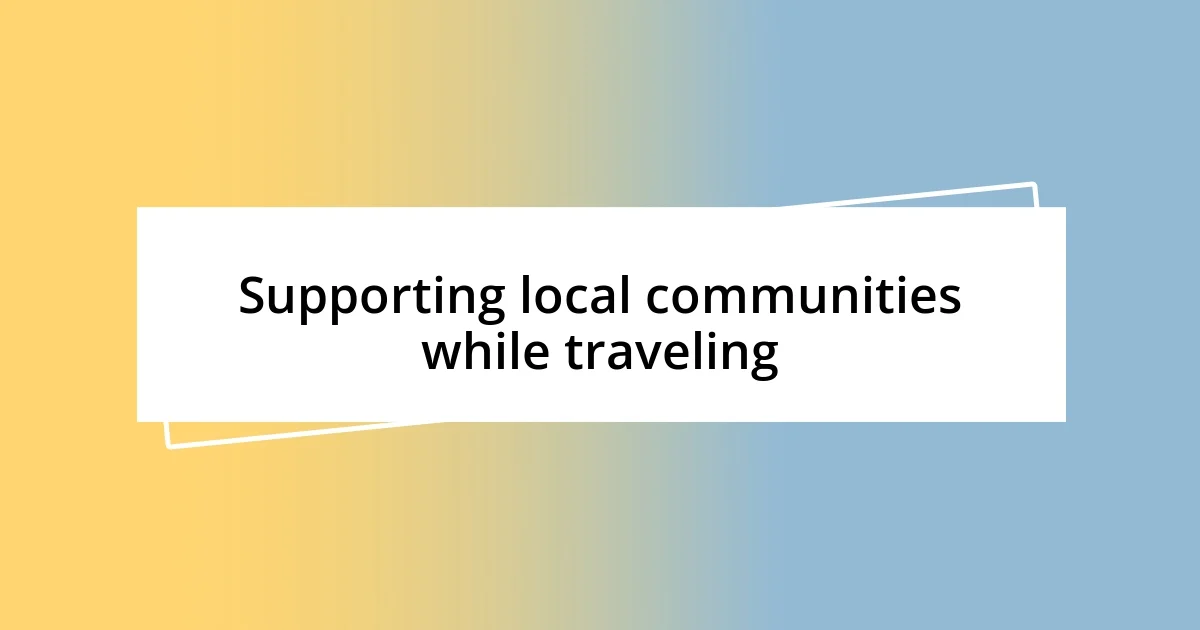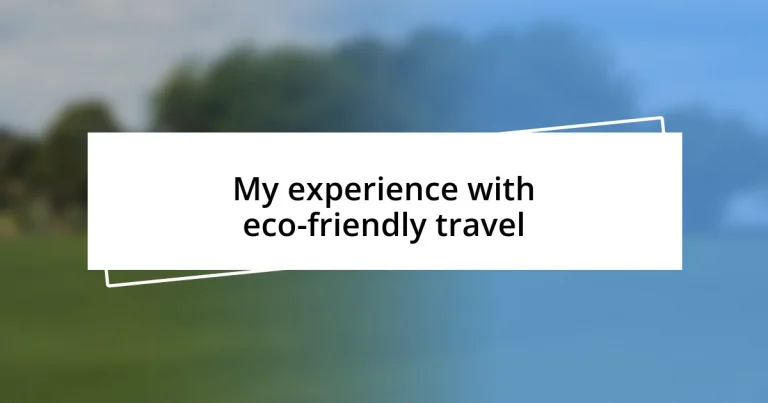Key takeaways:
- Adopting eco-friendly travel choices, such as using public transport and supporting local communities, enhances personal experiences while reducing environmental impact.
- Engaging with local cultures and practices fosters meaningful connections, preserves traditions, and contributes positively to the communities visited.
- Mindful packing and minimizing waste, like using reusable items and making intentional purchases, reflect a commitment to responsible travel that benefits both the traveler and the planet.

Introduction to eco-friendly travel
Eco-friendly travel is more than just a trend; it’s a commitment to exploring our world responsibly. I remember my first eco-friendly trip. I felt a sense of fulfillment as I chose a small, local hotel that practiced sustainable tourism. It wasn’t just a place to sleep; it was a starting point for authentic experiences, like learning about the community’s efforts to protect their environment. Have you ever had that feeling of being part of something bigger?
The choices we make while traveling can significantly influence the planet. When I switched to using public transport and bikes instead of taxis, I not only reduced my carbon footprint but also discovered hidden gems off the beaten path. Each ride felt like an adventure, and the people I met along the way enriched my journey in ways I never expected. Isn’t it amazing how the simplest decisions can lead to the most profound experiences?
Ultimately, eco-friendly travel encourages us to reflect on our impact while enjoying new landscapes and cultures. I often think about what legacy we want to leave for future generations. When I prioritize sustainability, I feel I’m contributing positively to the world—a tiny step that can lead to collective change. What kind of traveler do you want to be?

Benefits of eco-friendly travel
One of the most rewarding aspects of eco-friendly travel is the profound connection it fosters with local communities. During my travels, I often seek out initiatives that support local artisans, and I still remember visiting a small village where the locals taught me about their traditional crafts. I could feel their pride in sharing their culture, and it made my trip genuinely unforgettable. By supporting these initiatives, I not only enriched my own experience, but I also contributed to the community’s sustainability.
Here are some key benefits of eco-friendly travel:
- Preservation of Natural Resources: By choosing eco-friendly options, we help maintain the delicate balance of local ecosystems.
- Cultural Respect and Preservation: Sustainable travel encourages respect for local traditions, helping to keep unique cultures alive.
- Healthier Choices: Many eco-friendly accommodations offer organic meals and promote outdoor experiences, contributing to better physical and mental health.
- Enhancing Travel Experiences: I’ve found that engaging with local environments showcases a side of destinations that many tourists miss, providing memories that last a lifetime.
- Community Impact: The money we spend goes further in communities that reinvest in local projects, ultimately improving quality of life.

Choosing sustainable destinations
Choosing sustainable destinations can transform your travel experience in ways you might not expect. I vividly remember planning a trip to Costa Rica and focusing on eco-lodges nestled in the heart of the rainforest. Not only did these places prioritize biodiversity, but they also offered guided tours led by locals who shared their deep knowledge of the ecosystem. This approach allowed me to connect with the destination on a level that a typical hotel stay wouldn’t have provided.
I encourage you to consider the environmental impact of popular tourist spots versus lesser-known gems. For instance, visiting regions that promote eco-tourism, like the Azores in Portugal, not only supports sustainable practices but also introduces you to breathtaking landscapes that aren’t overrun by tourists. The quieter trails and pristine beaches were a refreshing escape; I often found myself reflecting on how deeply I appreciated the untouched nature around me.
Lastly, make sure to dive into the community’s sustainability efforts when selecting your destination. For example, I was touched by the locals in a small town in Louisiana who revitalized their habitat through coastal restoration. Participating in a clean-up event while I was there truly left me feeling like I was part of something bigger. It showed me that travel isn’t just about seeing new places; it’s about weaving your journey into the fabric of the lives that are already there.
| Destination | Key Sustainable Practices |
|---|---|
| Costa Rica | Eco-lodges and local guides promoting conservation |
| Azores, Portugal | Support for eco-tourism with well-preserved natural environments |
| Louisiana, USA | Community-driven coastal restoration and clean-up efforts |

Eco-friendly travel methods
Exploring eco-friendly travel methods truly enriches my journey, and one of my favorites is using public transport when I can. On a recent trip to Europe, I hopped on trains and trams instead of renting a car. Not only did it minimize my carbon footprint, but I also had the chance to observe daily life unfold around me, from bustling city squares to serene countryside landscapes. Isn’t it fascinating how much you can learn simply by sharing a ride with locals?
Cycling is another incredible way to travel sustainably. I recall a cycling tour through the vineyards of northern Italy where I was able to pedal from one charming town to another. The fresh air and the physical activity brought me closer to the stunning scenery, and I felt a real sense of accomplishment each time I reached a new destination. Plus, local wineries welcomed us with open arms, demonstrating their commitment to sustainable practices. Have you ever felt that thrill of discovering hidden gems just off the beaten path?
Lastly, I’ve found that supporting eco-friendly accommodations is essential for eco-conscious travel. During my stay at an eco-resort in Thailand, I was amazed by their commitment to sustainability—from solar panels powering the facilities to locally sourced, organic meals. Each evening, we gathered to discuss conservation efforts with the staff, which opened my eyes to how these practices impact the surrounding environment. It made me wonder: how much more connected could we feel to our surroundings if we chose to stay in places that reflect our values?

Packing for responsible travel
Packing for responsible travel means more than just fitting everything into your suitcase; it’s about making mindful choices. I’ve learned to prioritize multifunctional items that can serve several purposes, which not only saves space but reduces the need for unnecessary purchases on the road. For instance, my trusty sarong has been a blanket, a beach cover-up, and even a makeshift towel. When packing, I often ask myself: what can I bring that will truly enhance my experience without adding to my footprint?
One of the most rewarding parts of my packing routine is opting for reusable items. I never leave home without my stainless steel water bottle and cloth shopping bags. During a trip to Thailand, I noticed how often locals relied on single-use plastics. By using my own containers, I felt like I was setting a small example and contributing to the solution. It’s incredible how such simple changes can create a ripple effect; don’t you think every little action counts?
Moreover, I’ve started to carry my own toiletries in refillable containers. This not only cuts down on waste but also gives me the chance to use products that resonate with my values. On a recent adventure, I discovered a fantastic zero-waste shop to refill my favorite shampoo; it left me feeling inspired and aligned with my eco-conscious goals. It made me wonder: if we start our journeys with intention, how much more enriched will our experiences be?

Reducing waste while traveling
Reducing waste while traveling is an area where I’ve really made an effort to improve. On my last trip, I opted for digital tickets instead of printed ones. The convenience of having everything on my phone not only eliminated paper waste but also made me feel more organized. It got me thinking about how technology can help us lessen our environmental impact—do we truly need to carry around all that paper?
I also discovered the joy of forgoing single-use items altogether. Once, while visiting a remote island, I brought my own utensils and a plate for meals. To my surprise, the locals were impressed and even asked to borrow my reusable items! It struck me how small gestures can foster a sense of community and encourage others to rethink their habits. Have you ever experienced that moment when your choices inspire another to consider a different path?
Lastly, I can’t emphasize enough the importance of being mindful about souvenirs. Instead of mindlessly collecting trinkets, I started seeking out locally made items that reflect the culture of the place. On my trip to Mexico, I bought a handwoven bag from a local artisan instead of generic mass-produced goods. This not only reduced waste but connected me more deeply to the people and traditions I was experiencing. Isn’t it incredible how a simple choice can transform our travels into something more meaningful?

Supporting local communities while traveling
When I travel, I make it a point to support local communities by engaging with their businesses. During a trip to a small town in Portugal, I stumbled upon a family-run restaurant. The warmth of the locals was palpable as they shared their history and the story behind each dish. I remember savoring every bite of the home-cooked meal, feeling a connection that a chain restaurant simply couldn’t provide. Isn’t it amazing how food can bridge cultures and create lasting memories?
Shopping at local markets is another way I’ve connected with communities. Last year, while exploring a vibrant market in Bali, I exchanged stories with a textiles vendor who taught me about the significance of the fabrics she wove. Buying directly from her not only supported her craft but made me appreciate the artistry involved in each piece. I felt a sense of responsibility; I wasn’t just a tourist—I was part of a larger story. Have you ever felt that sense of connection while engaging with local artisans?
Additionally, I’ve participated in community projects during my travels, which have been incredibly fulfilling. On a trip to Costa Rica, I volunteered with a local organization focused on environmental conservation. Working alongside the community, planting trees and cleaning beaches, I saw firsthand how much these efforts mattered to them. That experience deeply shifted my perspective—traveling isn’t just about exploring new places; it’s about leaving a positive impact. How can we not contribute, especially when our travels can be a force for good?














